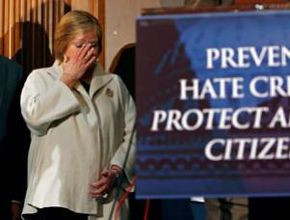Hate Crimes
Defined by the American Psychological Association (APA) as "violent acts against people, property or organizations because of the group to which they belong or identify with, hate crimes (also known as bias crimes) are all too common today, despite a crackdown in recent years by the Federal Bureau of Investigation (FBI) and other law enforcement agencies. In fact, the FBI reported that 2006 saw an 8 percent increase in hate crimes nationwide from 2005. Nearly 8,000 hate crimes were committed in 2006 and ranked in this order in terms of numbers: anti-black (2,640), anti-Jewish (967), anti-white (890), anti-male homosexual (747), anti-Hispanic (576), anti-Islamic (156) and anti-female homosexual (163).
People who commit hate crimes are not believed to be very different than most people. A study conducted at the University of California, Los Angeles profiled 550 hate crime criminals to determine which factors may contribute to the perpetration of hate crimes. The researchers found that the criminals tend to be more aggressive and inclined to exhibit antisocial behavior, but for the most part aren't mentally unstable. Jack Glaser, Ph.D., with the University of California, Berkeley, says "hate crime perpetrators are not typically psychopaths. They are mostly 'normal,' but excessively prejudiced. If they are also relatively prone to violence or destructiveness this can lead to hate crime." The UCLA study also showed that many of the perpetrators studied had a strong family history of violence and abuse. Typically, hate crimes are more likely to be planned and intentional than spontaneous.
Advertisement
According to APA, hate crimes are considered message crimes, in that they're intended to send a clear message to the intended group that they are not liked and are not welcome. Recent efforts to strengthen anti-hate crime legislation have been stopped short with insufficient votes to ensure passage of the bill. Current federal law, enacted in 1968, allows for the prosecution of a hate crime only if it meets two criteria:
- The crime must have been motivated by racial or religious bias
- The crime was intended to keep the person from voting, attending school or another federally protected liberty.
Under this law, hate crimes based on gender, disability or sexual orientation are not recognized [source: Civilrights.org].
Despite perceived limitations to existing hate crime laws, current civil rights laws do allow for the prosecution of violent crimes regardless of specific motivation. Advocates emphasize that all violent crimes should be prosecuted swiftly and justly, regardless of motivation.
Hatred, via the avenue of hate crimes, has a tremendous effect on society. According to Dr. Glaser, "It can certainly play a role in causing people to commit hate crimes, and marginalize communities who are common targets of hate crime." These acts of violence and disdain polarize groups and create negative emotions, furthering feelings of hate all around. Historical cases of hate crimes include the following:
- The extermination of between 5 and 6 million Jews in the Holocaust by Nazi Germany [source: History.com].
- Numerous lynchings of blacks, especially between from the late 1800s to the mid-1900s.
- More recently, the murder of James Byrd, a black man who was dragged to death by white supremacists in Jasper, Texas in 1998.
- The murder of University of Wyoming student Matthew Shepard, an openly gay man who was beaten to death by two men in 1998.
Despite the lessons of the past, numerous hate organizations are still in existence today, including the Ku Klux Klan, the White Aryan Resistance and the National Association for the Advancement of White People, led by David Duke.
Did you know that hatred may be bad for you? Learn more on the next page.
